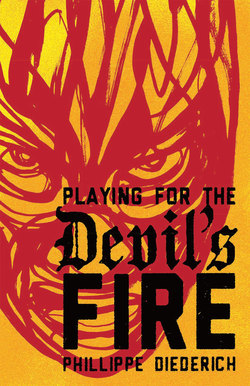Читать книгу Playing for the Devil's Fire - Phillippe Diederich - Страница 11
На сайте Литреса книга снята с продажи.
Оглавление5.
It was still dark when Gaby and I walked to the panadería the following morning. My parents had already left for Toluca. The roosters crowed and the loud diesel engines of the trucks barreling down the mountain on the new highway sounded like a distant parade. Some of the streetlamps didn’t work so the road was a mix of light and dark patches. It hadn’t rained in months, but the morning dew on the stones made the narrow street slippery. My dog Chapopote, a black mutt I had adopted a few years ago, followed us for a couple of blocks. Then he got distracted with a smell and trotted off.
When we came home that evening, my parents hadn’t come back. We tried my father’s cell phone, but there was no answer.
We sat down to dinner. Abuela came to the dining room without protest. There was no one to give her a hard time about eating her food. Jesusa brought her a cup of coffee right away. Abuela smiled and thanked her and even asked her to sit with us, calling her Susana.
Gaby sat at my father’s place. She didn’t say anything. She just dug into her enchiladas as if she hadn’t eaten for days. Jesusa returned from the kitchen with a plate for herself and took my mother’s place at the table.
“Buen provecho,” she said. It was the first time she’d ever sat with us at the big table.
Then Abuela started. “I wasn’t impressed by the fancy camera. Dorian said he had studied with some man Castillo, who had photographed la revolución with a plate camera alongside Casasola.” She told us it didn’t impress her that he and another man named Turok had been commissioned by the government to make an important photographic document of Mexico. Or that he was half gringo. But she cared that he was handsome, rugged. She cared for him a lot more than she cared for the other man Tizapa. “Dorian was no dandy. I can tell you that.”
When Abuela stopped talking to sip her café, Gaby turned to Jesusa. “Did you hear about Rocío Morales?”
Jesusa set her fork down and her black almond eyes grew round. “And Enrique Quintanilla. Everyone is scared. People said he talked too much about what was none of his business, pues.”
“What did they say?” I asked.
“Pues, Hortensia, the one who brings the tortillas, she said people are moving into town. They’re building big houses in Montes de Oca. And up in Santacruz too.”
Santacruz was Mosca’s neighborhood. It was at the top of the mountain north of town, just past the creek and the old highway. When you drove into town from the west on the old highway, the first thing you saw was the giant white metal cross at the highest point of the mountain. The people there were poor, but not dirt poor like the real gente pobre from the neighborhoods like Montes de Oca. Or further past the trash dump and the Flats on the other side of the new highway where Lucio lived. I guess Santacrúz was an in-between place, a sort of between us who had some money and those who were really poor.
Abuela laughed. “I was surprised to find out he was interested in me.”
Jesusa smiled at her, then she turned to Gaby. “Any news of your parents?”
Gaby shook her head. “Mamá said it might take them a couple of days.”
“Lucky,” I said.
“Lucky how, you fool? They’re working.”
“Yeah, but Toluca rules.”
“Whatever.” Gaby rolled her eyes. “And just because they’re not here you can’t just go around goofing off. There’s school tomorrow.”
“I’m watching a movie tonight.”
“I’m watching my novela.”
“Don’t worry,” I said. “My movie’s not on ‘til eleven.”
Jesusa turned to Gaby. “¿El dolor del amor?”
After dinner, we all sat together on the big couch. My father had reupholstered it last year in bright orange fabric he got from Don Bonifacio’s store and covered it with thick transparent plastic.
Personally, I wasn’t interested in the soap opera, but there was nothing else to do. Besides, I wanted to stay up in case my parents arrived. I wanted to ask my father for a loan for the wrestling tickets. I figured I could pay him back by working at the bakery.
When the novela was over, Gaby went to bed. Abuela and Jesusa stayed up with me to watch Santo contra el rey del crimen, the quintessential Santo movie. It was an old black-and-white wrestling movie. True. It didn’t have the best action, and it didn’t have a lot of fighting compared to the other ones, but I could relate to the plot. I mean you get to see Santo when he was a boy, like my age. People forget that he had to come from somewhere. He was fighting against injustice since he was a kid. I totally got that. Even as children we have to face bad guys, bullies, big kids, drunks, whatever. But Santo, he was lucky. His father had the mask and passed it down to him.
I guess that’s what I always liked about these movies. They weren’t about heroes with supernatural powers. They were about real people. They gave me the feeling that I too could be like Santo. I guess deep down I was hoping that one day my father would reveal some kind of secret identity he could pass on to me, giving me the responsibility of fighting crime. Maybe I would find myself in a situation where I had to save Ximena from the bad guys, from Zopilote or whoever. Then she would fall in love with me, just like the women always fall in love with Santo.
